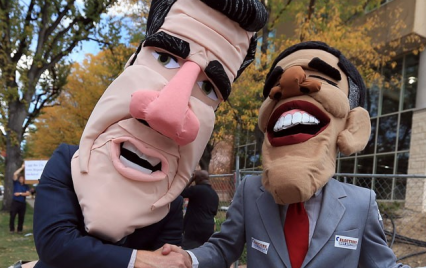We’ve all heard that Leaders should keep learning, right?
But what should be the focus of this learning?
<cue suspenseful music>
In case you haven’t been here before, I’m a Contributor at the Deeper Leader SyncrhoBlog that runs September 10-14th.
You are invited to add your voice to the greater dialogue too. Go here to get details, get your spiffy Badge, and get started! I’ll be sure to check for your link and read your contribution.
So, what’s important for Leaders to learn?
They’ve actually studied this stuff, so rather than just give you my opinion, let’s look at what the research from the Center for Creative Leadership found.

When subordinates rated their company leaders, failure was found, quite a bit. But, their failures of leadership overwhelmingly stemmed from certain character qualities and interpersonal relationships rather than their technical skills needed to do their job well.
Their failures were actually personal failings.
Poor or inconsistent values and the inability to communicate and interact well with their co-workers were the biggest problems. By a long shot.
When leaders were considered failures personal failing were overwhelmingly the reasons why. This isn’t just true for only the corporate world, is it?
See, Technical training is fairly easy to do, and most companies may do that sort of training. Lots of place can educate you with book knowledge. But, training some one to be a better person from the inside out, well, that’s hard. It rarely happens formally, to be honest. But, obviously, according to the little black bar at the bottom there, this is the kind of education and transformation is a must for leaders to truly succeed.
Learning and revising our most core-level traits and behaviors moves into spiritual issues. Growth at a spiritual core-level is how transformational personal change can happen. But, there has to be a hefty “want to” from the learner. Time, money, and effort is needed, even if the learning isn’t formal. Too few meet the challenge; the media reports these failings daily. Authority figures are dropping like flies, people.
A company can’t force a person to take up this hard task, it comes from a internal commitment to do better, look at the negative stuff, make new habits, and do what ever hard work is necessary to improve. And when guidance and mentoring moves the learner beyond theory to applying the new lessons learned, personal or professional success is far more likely is the short and long terms.
One of the reasons I’m supporting this Synchroblog effort is because it pairs with a new program [A Master of Arts Degree in Christian Leadership] that focuses developing the spiritual formation of Leaders as well as important management skills. It’s education that will help improve all facets of one’s life and career.
The shortages of integrity in leadership don’t have to be the norm, and I don’t want it to be.
Sure, it’s harder than learning a new technique in organization or production, but it sets up the learning leader to succeed not just in her current position of leadership, but in all the aspects of her life now, and later when other challenges arise.
Maturity, integrity, and harmony with others is what makes a leader worth following.
When leaders fail it’s usually because they haven’t taken the time and done the hard internal and ongoing work to grow, mature, and be a better person. So, let’s do the hard the hard work, and encourage other to do the same.
That is what a Leader should continue to learn.






